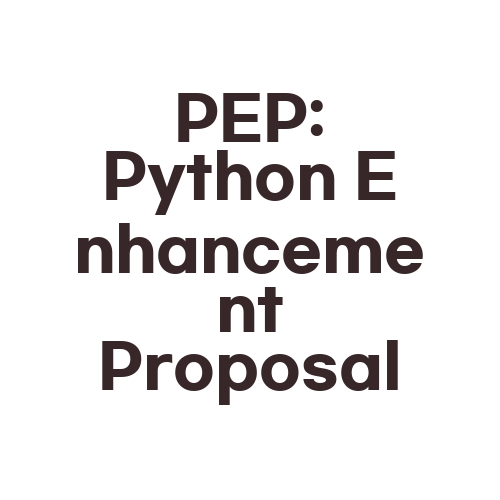PEP: Python Enhancement Proposal

PEP: Python Enhancement Proposal
A Brief History of PEP
PEP, also known as Python Enhancement Proposal, is a system created to propose and discuss features and improvements to the Python programming language. It was first introduced in 2000 by Guido van Rossum, the creator of Python, as a way to formalize the process of introducing new ideas and changes to the language. Since then, PEP has become an integral part of the Python community, with thousands of proposals and discussions taking place over the years.
If you want to learn more about the history of PEP, you can visit the official Python website at https://www.python.org/dev/peps/pep-0001.
Representative of PEP
The representative of PEP is the Python Software Foundation (PSF), a non-profit organization that was formed in 2001 to promote, protect, and advance the Python programming language. The PSF is responsible for managing the development of Python, including the review of PEP proposals, the appointment of PEP editors, and the funding of Python-related events and initiatives.
To learn more about the Python Software Foundation and its role in the community, you can visit their website at https://www.python.org/psf/.
The Vision of PEP
The vision of PEP is to create a collaborative environment where Python developers can propose, discuss, and refine new ideas and changes to the language. By providing a structured process for submitting and reviewing proposals, PEP helps ensure that the Python language continues to evolve in a consistent and effective manner.
If you’re interested in learning more about the vision and goals of PEP, you can read the PEP 1 document on the official Python website at https://www.python.org/dev/peps/pep-0001.
Corporate Information of PEP
PEP is not a corporation, but rather a community-driven system that is managed by the Python Software Foundation and maintained by a team of volunteers. While there is no direct corporate involvement in PEP, many companies and organizations contribute to the Python ecosystem by developing and supporting Python-based technologies and tools.
To learn more about the companies and organizations that are involved in the Python community, you can visit the PyCon website at https://us.pycon.org/2020/.
Frequently Asked Questions About PEP
What types of proposals can be submitted to PEP?
PEP is designed to accept proposals for changes and improvements to the Python language, as well as related technologies and tools. Proposals can range from minor tweaks to the language syntax to major additions that introduce new functionality.
How are PEP proposals reviewed and approved?
PEP proposals are reviewed and approved by a team of volunteers known as PEP editors. The editors evaluate each proposal based on its technical merit, its compatibility with existing Python standards, and its potential impact on the Python community.
Can anyone submit a proposal to PEP?
Yes, anyone can submit a proposal to PEP. However, it’s important to note that not all proposals are accepted or implemented. Proposals that are well thought-out, carefully researched, and technically sound are more likely to be approved than those that are incomplete or poorly written.
Conclusion
PEP is an essential component of the Python community, providing a structured and collaborative process for proposing and refining new ideas and changes to the language. By promoting open discussion and evaluation of proposals, PEP helps ensure that Python continues to evolve in a consistent and effective manner. Whether you’re a seasoned Python developer or just getting started with the language, PEP offers a valuable resource for learning about Python and contributing to its ongoing development.
If you want to learn more about PEP and related search words such as “Python Enhancement Proposal” and “Python Software Foundation”, you can visit the Python website at https://www.python.org/.